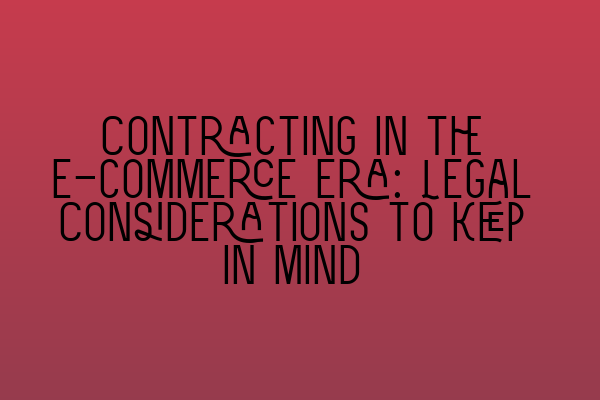Contracting in the E-commerce Era: Legal Considerations to Keep in Mind
Welcome to SQE Contract Law, where we provide comprehensive legal insights and expertise in the field of contract law. In today’s digital age, e-commerce has become an integral part of nearly every industry, allowing businesses to conduct transactions online with ease. However, the convenience of online contracting does not exempt businesses from legal obligations and considerations. In this article, we will explore the legal implications and key considerations for contracting in the e-commerce era.
The Basics of E-commerce Contracts
Before delving into the nuances of e-commerce contract law, it’s essential to understand the basics of these contracts. In e-commerce, contracts are formed through electronic means, such as online marketplaces, websites, mobile applications, or even email interactions. While the mode of communication may differ, the fundamental principles of contract law still apply.
One critical element of an e-commerce contract is the offer and acceptance. The offer is typically made by the seller through displaying goods or services on their website, and the buyer accepts the offer by adding the items to the virtual shopping cart and completing the payment process. It’s crucial for businesses to ensure that their online platforms clearly communicate these offer and acceptance terms to avoid any confusion or disputes.
Furthermore, e-commerce contracts must meet the requirements of a valid contract, which include:
- Offer and acceptance
- Consideration
- Legal capacity
- Intention to create legal relations
- Free consent
By adhering to these contract essentials, businesses can establish enforceable agreements in the e-commerce realm.
The Importance of Clear Contractual Terms
In the e-commerce era, it’s crucial for businesses to provide clear and comprehensive contractual terms to protect their rights and obligations. This is especially important given that many e-commerce transactions are conducted without face-to-face interaction. A well-drafted contract can help prevent misunderstandings, minimize disputes, and provide a clear framework for all parties involved.
When drafting contractual terms for e-commerce transactions, businesses should consider the following:
- Description of Goods or Services: Clearly define the goods or services being offered, including any applicable specifications, measurements, or quality standards.
- Pricing and Payment Terms: State the price of the goods or services, any applicable taxes or additional charges, and the accepted methods of payment.
- Delivery and Shipping: Specify the delivery timeframe, shipping methods, and any associated costs or responsibilities.
- Returns and Refunds: Outline the policies and procedures for returns and refunds, including any applicable conditions or time limits.
- Intellectual Property Rights: Clarify the ownership and licensing rights of any intellectual property involved in the transaction, such as copyrights or trademarks.
- Dispute Resolution: Include a clause specifying the preferred method of resolving disputes, such as arbitration or mediation.
By incorporating these key terms and provisions, businesses can establish a strong foundation for their e-commerce contracts.
The Legal Implications of Distance Selling Regulations
In the e-commerce era, businesses must also be aware of the legal implications of distance selling regulations. Distance selling refers to transactions where the buyer and seller are not physically present in the same location when making the contract.
The United Kingdom has implemented various regulations to protect consumers engaged in distance selling transactions. These regulations include providing consumers with clear information about the goods or services, their pricing, delivery, cancellation rights, and refunds. Failure to comply with these regulations can result in legal consequences and damage to a business’s reputation.
Therefore, it’s essential for businesses to understand and adhere to the relevant distance selling regulations to ensure compliance and maintain positive customer relationships.
Conclusion
Contacting in the e-commerce era requires businesses to be well-versed in the legal considerations unique to online transactions. By understanding the basics of e-commerce contracts, providing clear and comprehensive contractual terms, and adhering to distance selling regulations, businesses can mitigate risks, protect their rights, and build trust with their customers.
At SQE Contract Law, we understand the complexities of contract law in the e-commerce era. Whether you need assistance with contract drafting, interpretation, or dispute resolution, our team of experienced solicitors is here to provide personalized legal solutions tailored to your specific needs. Contact us today for a consultation.
Related Articles:
- Exploring the Impact of Frustration on Contractual Obligations: Legal Insights
- Elevate Your Knowledge with Contract Law Tutorials
- Interpreting Contractual Clauses: Unlocking the Hidden Meanings
- Legal Aspects of Business Contracts: Key Considerations for Entrepreneurs
- SQE Contract Law vs. Traditional Qualifications: A Comparative Analysis
